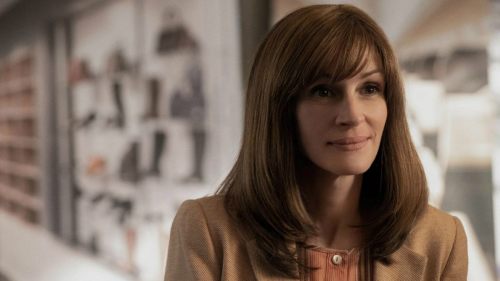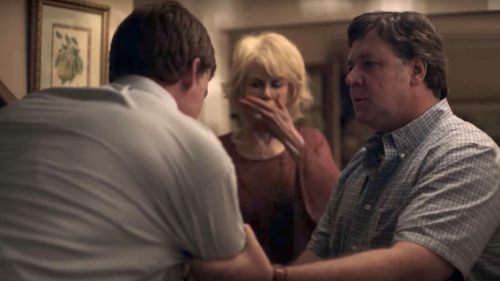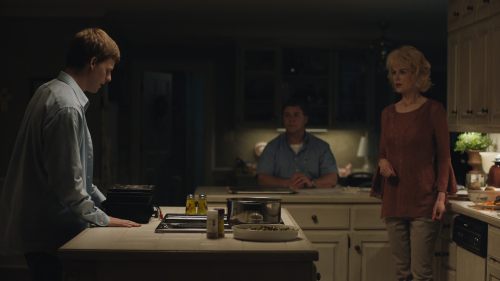Is IT COMES AT NIGHT A Horror Film For Trump’s America?
It Comes at Night comes out tomorrow. Get your tickets here!
In writer/director Trey Edward Shults’ It Comes at Night, the threat that endangers the film’s small group of characters is not in fact a tangible “it,” but paranoia and mistrust brought on by extreme circumstances. In the midst of an unidentified, virulent plague, Paul (Joel Edgerton) has taken his wife Sarah (Carmen Ejogo) and teenage son Travis (Kelvin Harrison Jr.) to live in a remote, boarded-up house. Paul has set up rules and routines they must follow to ensure their survival, which are put to the test when another desperate family man, Will (Christopher Abbott), arrives in search of aid for his own spouse and young child.
Suspicion of outsiders and the determination to protect what one has within one’s walls are keenly relevant topics given the current U.S. political situation, making It Comes at Night very much a movie of its time. “It’s fascinating that it can be taken in that context, because I wrote it before the current political regime,” notes Shults, who was first compelled to do so by his strong emotions following the death of his father. “I wrote it back in 2014, and what I was drawing from was more like history, and the cycles of this kind of thing, and my fear that bad stuff was coming—either for me personally, or just bad times in general. I think it’s up to the audience to decide how they interpret it, and things are left open in the storytelling in such a way that I hope different people will take different things from the movie, but I do believe it’s very timely, and that it has a message that is timely.”
Lead actor Edgerton also finds a topicality lurking just beneath the surface of It Comes at Night’s harrowing personal drama. “The movie says a lot without ever really having to point to it,” he says. “It’s a genre film that has a foundation where you can look at it and go, ‘This is sort of what it’s like for all of us right now.’ I think it says a lot about the fear of the other, and there’s definitely a bit of a parable where you can look at Paul’s family as one culture, and it’s like, ‘Yeah, come be part of our community, and live by our rules and share all your stuff with us, but we’re not sure we can trust you. We’re not sure what’s going on in your mind, and what you want from us. Do you want to give or do you want to take?’
“It’s about how we’re very quick to judge other people when society has a volatility to it,” Edgerton continues, “where it’s safer to not trust than to trust, because we see trust and harmony as sort of weaker traits. It leaves us vulnerable to say, ‘I trust you, and I’ll give you the keys to my kingdom.’ And then you come home, and the treasure chest is empty. So it’s easier to draw lines in the sand with other people, and to set limits and rules.”
Ejogo, who previously dealt with topical American terrors in The Purge: Anarchy, believes that while Shults wrote It Comes at Night a couple of years before the divisive election of 2016, he did tap into the feelings that led to it. “Trey may not have set out to make a kind of cautionary tale about what happens when you allow paranoia to run your life, but it turns out that it has become that, regardless,” she says. “Trey didn’t intend to tap into the zeitgeist, but I believe he is typical of many artists who have their feelers out in the wind for what is sort of an undercurrent of attitudes. What we’re dealing with in 2017 in America, or what we are seeing around the world, whether it’s about terrorism, fascism, all these various forces that seem to be rising—they don’t happen overnight. If you know your history, if you try to keep your finger on the pulse, or if you’re an artist in the world and you just have your antenna out, you saw this coming for years, right? So while it’s true Trey wrote this three years ago with no real intention of making a film that would make sense in this moment, I think it’s equally true that he just had a feeling about it.”
At the same time, It Comes at Night is an inclusive film in the way it focuses on an interracial family under great stress and strife without race ever becoming an issue. Much like the thematically similar Night of the Living Dead, a movie Shults admires, the filmmaker says, “It was just about casting the best people. Of course, within that, you can’t not think about it, and I believe it’s responsible to think about it. But it’s also great that that can just be in the movie and we don’t comment on it. Because it’s not a movie about race, it’s about these people and how fear destroys them beyond race, apart from that, you know what I mean? That was very interesting to me.”
“What was so audacious about committing to that idea with me,” Ejogo adds, “is that he understood that that would therefore mean he’d have to also cast his point-of-view character, Travis, with somebody who was also going to be non-white. That’s where you have to really applaud both A24 and Trey, for having no fear of making that choice, and recognizing the power in that choice, and recognizing that it was going to be one that paid off. You so often see the same faces on screen, and if they’d just chosen the actor who was best for the part as opposed to the name, or because they look a certain way, you know it would have been a better film. Sometimes studios and films get away with it, and many times they just don’t, and the more people work from a place of real authenticity in terms of their decisions—casting-wise and so on—I think we as an audience will continue to benefit, because the movies will be a more authentic experience.”



